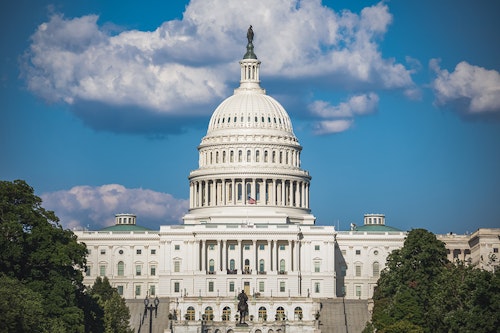Three Ideas to Make Government Programs Work Better

There’s an expectation that essential things have got to work. No one wants a bungee cord, defibrillator paddles, or grocery stores to stop functioning. And, love it or hate it, the federal government is essential in our lives. The federal government employs more than 2 million civilians across every state and territory. It’s also the largest customer in the world, spending hundreds of billions on everything from bridge support beams to medicine for ailing seniors. And overall federal spending amounts to about a quarter of our gross domestic product.
Whether you’re a Democrat or Republican, there’s a real need to ensure federal programs are working better and smarter. Luckily, there are numerous efforts that are percolating—both within the halls of Congress and among leading thinkers working to modernize government. Below, we explore three recent proposals that policymakers should pay attention to.
1. Bipartisan Proposal on Unemployment Insurance Modernization
Unemployment Insurance (UI) is an essential lifeline for those who lose their job, but the COVID-19 crisis helped expose that the program is riddled with issues. In February, the heads of the Senate Finance Committee, Senators Ron Wyden (D-OR) and Mike Crapo (R-ID), put out a bipartisan framework to improve many parts of the UI system. Their proposal would help UI fight fraud and make it easier to recover overpayments. It would also modernize the program with better data sharing, helping states administer their programs. Finally, it would update the administration for beneficiaries, improving online claim filing systems and ensuring employers facilitate access to benefits.
This is exactly the type of idea that should have broad support—rooting out waste and fraud, while improving the experience for individuals who need it.
2. President’s Proposal on Program Integrity
In his FY 2025 budget proposal, President Joe Biden made two key program integrity pushes: 1. fully fund program integrity discretionary spending cap adjustments, and 2. restore and extend the IRS modernization funding.
For years, the federal government has appropriated funding for specific programs that improve program integrity and lower net costs for the federal government:
The Social Security Administration receives special funding to conduct continuing disability reviews, better consider Supplemental Security Income eligibility, and investigate and prosecute fraud. These efforts are projected to get between $3-9 of return for every $1 spent.
The Department of Health and Human Services receives funding to build more medical reviews in Medicare, increase proper payments in Medicare Parts C and D and Medicaid, and increase knowledge about improper payments in the ACA health insurance marketplace. President Biden’s budget estimates his spending levels net $8.3 billion in savings with $2 dollars of return for every $1 spent.
The Unemployment Insurance program receives funding for reemployment services and eligibility assessments for those likely to be unemployed the longest, giving them additional services to find a job. President Biden’s budget estimates this nets $1.3 billion in savings.
Separately, the President’s budget fully funds the IRS. The Inflation Reduction Act dedicated $80 billion in IRS modernization, but that funding has been partially chipped away by Congressional action. The President’s Budget takes another important step by extending the mandatory funding provided to the IRS through 2034. This is estimated to net $237 billion in deficit reduction. Policymakers should embrace this as well as work to reverse cuts to the Inflation Reduction Act’s $80 billion modernization infusion.
3. Blue Ribbon Report with Five Ideas to Fight Future Fraud
AGA, formerly the Association of Government Accountants, assembled a team of experts to study the US economic response to COVID-19 and how fraud permeated the often-overwhelmed benefit programs. Their report appropriately details the context of the historic challenge facing the country and those trying to stop fraud. It documents the fraud with brief case studies from the Small Business Administration and the Unemployment Insurance System, and it offers five suggestions for improvement:
- Systems should be created for early collaboration to fight fraud in emergencies from the local levels up to the federal government.
- Agencies and programs should maintain anti-fraud operational readiness before emergencies strike by having fraud mitigation in the day-to-day operation of a program.
- Programs that require applications for aid should have clear, definitive, and timely instructions.
- More data-sharing agreements should be built between agencies and programs so that eligibility for programs can be more clearly established.
- Watchdogs, like the Offices of Inspectors General, should be empowered in real time to analyze data and have opportunities to spot fraud and evaluate risk.

Making government programs work shouldn’t be a red or blue issue. All policymakers should be fighting to ensure government is modernized so that waste and fraud are reduced and programs work better for all Americans. The three initiatives noted above provide a good start, and there are numerous other ways to improve how Washington works. But it all starts with a core belief: the American people deserve an effective and responsive government.
Subscribe
Get updates whenever new content is added. We'll never share your email with anyone.
